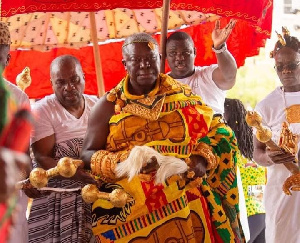The Golden Stool of the Asante Kingdom is one of its most significant traditional representations.
The stool, made out of pure gold, stands at 18 inches high, is 24 inches long, and 12 inches in width, according to blackpast.org.
The stool has been in existence since the reign of the Asantehene, Osei Tutu I, and is believed to house the soul of the Ashanti nation.
Due to its significance, the Golden Stool was never allowed to touch the ground and was considered so sacred that no one was allowed to sit on it.
However, the kings of the Asante kingdom are given a special dispensation of symbolically sitting on the stool once in their lives.
Sharing the details of how and when this opportunity is given to the Asantehene, a local heritage expert, Osei Bonsu, told the BBC in an interview that at the coronation of the king, he is made to symbolically sit on the stool three times.
“The king sits on a wooden stool embossed with gold, not the Golden Stool. The golden stool is not meant for anybody to sit on it. The king’s bottom is touched on the Golden Stool three times, that is the first time he is elected as king.
“People hold him, and his bottom is touched on the Golden Stool only three times, and that is for his lifetime,” he explained.
About the Golden Stool:
According to blackpast.org, no one is considered a legitimate ruler without the Golden Stool, which usually occupied its own throne next to the Asantehene.
The Asantes maintained the Golden Stool as their most prized possession. Before they went to war, their war chiefs consulted it. As time progressed and as the Asantes scored more victories over their rivals, turning their kingdom into an empire, the Golden Stool became even more revered.
By the 19th Century, the Asantes began a series of clashes with the British Empire which had established effective control of the coastal region of what is now Ghana. They fought three Anglo-Ashanti Wars between 1824 and 1874, with the British and their African allies gaining more control over Ashanti Territory.
During the fourth Anglo-Ashanti War, the British and their Indian and African allies defeated Asantehene Agyeman Prempeh, eventually capturing him and sending him into exile in the Seychelles Islands.
The final war (1900), essentially a rebellion led by Yaa Asantewaa, the Queen Mother and Gate Keeper of the Golden Stool, was prompted by the demand by Sir Frederick Mitchell Hodgson, the British Governor of the Gold Coast to sit on the Golden Stool. With his remark, Yaa Asantewaa led a rebellion called the Word of the Golden Stool which began on March 28, 1900.
The intense fight led to the death of more than 2,000 Asantes and 1,000 British and Allied troops. Both totals were higher than the deaths from all previous Anglo-Ashanti wars combined. The war ended after six months.
Yaa Asantewaa was captured by the British in 1901 and quickly exiled to the Seychelles, where she died in 1921, but the British never captured the Golden Stool. Hidden by the Asantes, it was discovered by a group of African railroad builders in 1920.
They stripped it of its gold ornaments and were tried by the Asantes and sentenced to death. British colonial authorities intervened, however, and they were exiled from the Gold Coast Colony.
After realizing the importance of the Golden Stool to the Asantes, the British gave assurances that they would never interfere with it again. Restored to its ceremonial place, the Golden Stool continues to be used in rituals crowning the Asantehene, although he is now considered a traditional ruler without political power or influence. Nonetheless, the Golden Stool remains a cherished symbol of the former Ashanti Empire.
 Home Of Ghana News Ghana News, Entertainment And More
Home Of Ghana News Ghana News, Entertainment And More





